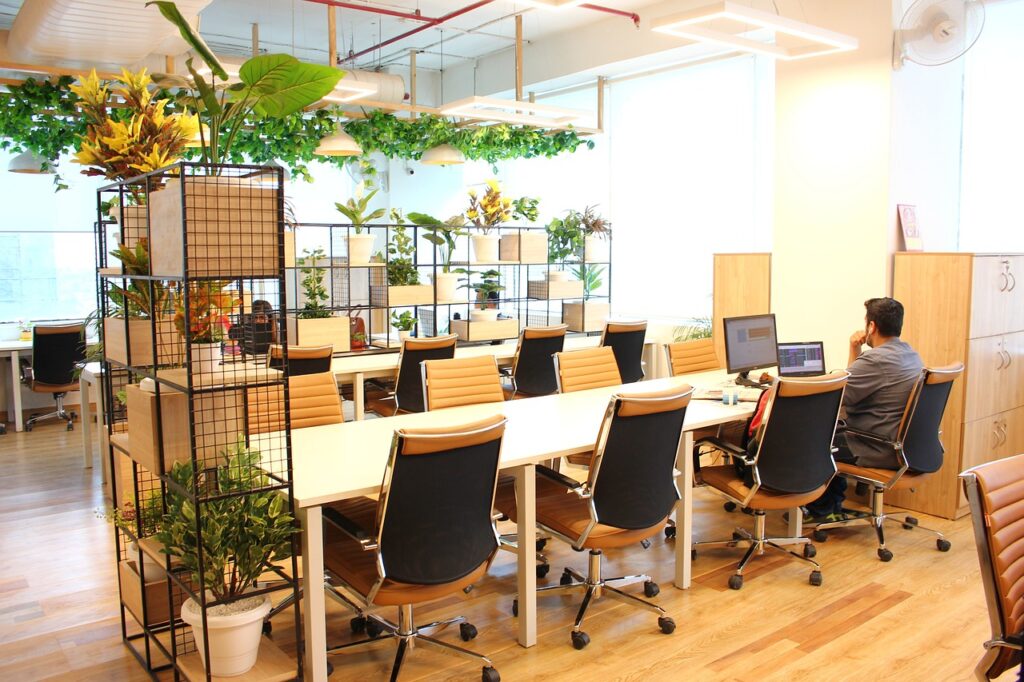Commercial properties form the backbone of business infrastructure, providing dedicated spaces for various industries to thrive and generate profits. Unlike residential properties, which serve as homes, commercial spaces are specifically designed to accommodate the unique needs of businesses. In this article, we will embark on a journey into the realm of commercial properties, delving into their definition and highlighting the diverse range of types that exist.
Commercial properties encompass a wide array of buildings, structures, and improvements situated on designated real estate with the primary intent of generating profits. From industrial facilities with expansive square footage and loading docks to retail properties where goods and services are sold, each type of commercial property serves a distinct purpose in the business landscape.
Understanding the different types of commercial properties is essential for investors, entrepreneurs, and professionals involved in the commercial real estate industry. By gaining insights into the characteristics, advantages, and considerations of each type, individuals can make informed decisions when it comes to leasing, purchasing, or developing these spaces.
Throughout this article, we will explore the multifaceted nature of commercial properties, shedding light on their unique features and potential benefits for businesses. By examining industrial spaces, retail properties, office buildings, and more, we aim to provide a comprehensive overview of the diverse options available in the commercial real estate market. So, let’s dive in and uncover the fascinating world of commercial property types.
Offices: Versatile Spaces for Business Operations
Offices are essential commercial properties used by businesses for various operations. They serve as dedicated work environments, accommodating administrative tasks, client meetings, and professional work. Offices are suitable for businesses of all sizes and industries, providing customizable spaces with amenities like restrooms, kitchens, and conference rooms. Professionals in sectors such as technology, healthcare, consulting, and more find offices ideal for their centralized operations and client interactions. With their adaptable nature, offices create productive environments tailored to specific business needs. These versatile spaces support productivity, collaboration, and efficient work environments for businesses across industries.
Office Building
Office buildings are versatile commercial spaces designed to cater to the diverse needs of businesses. They serve as the central hub for various professional services and administrative activities. These buildings consist of multiple floors with individual offices, common areas, and facilities like meeting rooms and reception areas. Office buildings are utilized by a wide range of businesses, including small startups, established companies, and professional service providers. They are particularly suitable for businesses in industries such as finance, technology, consulting, and law. Office buildings provide a conducive environment for work, fostering collaboration, productivity, and professionalism. With amenities like modern infrastructure, secure access systems, and parking facilities, office buildings offer a professional setting that meets the demands of businesses of all sizes.
Coworking
Coworking spaces have emerged as a popular trend in the commercial property landscape, offering a unique and flexible working environment. These spaces provide shared office areas where individuals and businesses can work independently or collaboratively. Coworking spaces are designed to foster creativity, networking, and productivity, making them ideal for freelancers, entrepreneurs, and remote workers. They offer various amenities such as shared desks, private offices, meeting rooms, and communal areas. Coworking spaces cater to a diverse range of professionals, including startups, creative professionals, consultants, and digital nomads. The flexibility of these spaces allows individuals and businesses to choose their preferred working style, whether it’s a single day’s use or a long-term arrangement. Coworking spaces also provide networking opportunities and a sense of community, making them a dynamic choice for those seeking a vibrant and collaborative work environment.
Small Offices
Small offices are compact commercial spaces designed to accommodate the needs of individual businesses or small teams. These spaces offer a dedicated working area, typically consisting of a private office or a small suite of offices within a larger building. Small offices are versatile and can be utilized by a wide range of businesses, including startups, consultants, freelancers, and professionals requiring a focused work environment. They provide the necessary infrastructure for day-to-day operations, including workstations, storage areas, and amenities like meeting rooms and communal spaces. Small offices offer businesses the advantage of privacy and control over their workspace, while benefiting from shared facilities and services within the building. They are an ideal choice for those seeking a cost-effective and efficient workspace tailored to their specific needs.
Retail
Retail spaces are considered commercial buildings where goods and services are sold to customers. They serve as vibrant hubs for various businesses, including shops, boutiques, supermarkets, and restaurants. Retail spaces are designed to attract customers, featuring attractive storefronts, ample parking areas, and convenient access for shoppers. These spaces are suitable for entrepreneurs, retailers, and businesses seeking direct interaction with their target audience. Retail spaces cater to a wide range of industries, including fashion, electronics, food, and more. They provide the infrastructure necessary for showcasing products, such as display shelves, checkout counters, and fitting rooms. Retail spaces play a crucial role in the economy, fostering commerce and creating opportunities for businesses to thrive. Whether it’s a bustling shopping center, a trendy mall, or a neighborhood retail store, these commercial spaces offer an engaging environment for businesses to connect with customers and drive sales.
Shopping Center
Shopping centers are expansive commercial spaces that encompass a variety of retail outlets, making them an essential part of the commercial property landscape. These centers serve as vibrant hubs where businesses of different sizes and types coexist under one roof or within one complex. They offer a diverse range of shopping experiences, including big-box stores, specialty shops, restaurants, and convenience stores. Shopping centers provide a convenient and centralized location for customers to access multiple retailers in one visit, making them suitable for individuals looking for a wide selection of goods and services. From department stores to boutique shops, a shopping center caters to various businesses, allowing them to thrive in a shared environment. The layout of shopping centers often includes open storefronts, ample parking areas, and common areas for customer engagement. Whether it’s a large-scale shopping plaza or a neighborhood strip mall, these commercial spaces create opportunities for businesses to connect with a diverse consumer base and foster retail growth.
Regional Store: Catering to a Wide Customer Base
Regional stores play a vital role in the commercial property landscape by offering a substantial retail space that serves a larger geographic area. These commercial spaces are typically larger and are designed to accommodate a wide variety of products and services. They serve as destination points for customers seeking an extensive range of options, attracting shoppers from a broader region. Regional stores are suitable for businesses that have a wide customer base and aim to establish a strong presence in a specific area. From departmental stores to specialty retailers, these spaces provide ample room for showcasing a diverse array of merchandise. They often feature spacious floor plans, multiple departments, and a comprehensive range of products to meet the needs and preferences of a diverse customer base. Regional stores serve as key retail anchors in commercial developments, drawing foot traffic and contributing to the overall vibrancy of the surrounding area.
Industrial Properties
Industrial properties form a crucial segment of the commercial property landscape, encompassing buildings and facilities dedicated to manufacturing, production, and warehousing operations. These expansive spaces are specifically designed to accommodate large-scale industrial activities, characterized by substantial square footage, loading docks, multiple HVAC units, and extensive electrical distribution points. They often feature easily accessible flat roofs, making them suitable for the installation of equipment and machinery. Industrial properties cater to businesses involved in heavy manufacturing, light assembly, and warehousing. Heavy manufacturing facilities house large machinery and equipment, producing heavy-duty products, while light assembly facilities focus on smaller goods. These properties are ideal for manufacturers, distributors, and logistics companies seeking spacious environments to streamline their operations and support efficient supply chain management. Industrial commercial properties provide the infrastructure and amenities necessary for industrial-scale production and storage, driving economic growth and fostering industrial development.
Warehouse
Warehouses are vital components of the commercial property landscape, serving as dedicated spaces for the storage and distribution of goods. These versatile facilities feature open layouts with ceilings that extend to the roof’s interior structure, allowing for the accommodation of high freestanding or installed rack systems. Warehouses are designed to optimize space utilization and facilitate seamless logistics operations. They are suitable for businesses involved in inventory management, supply chain operations, and e-commerce fulfillment. Warehouse spaces often include dedicated truck terminals for efficient loading and unloading of goods. While some warehouses focus primarily on storage, others combine storage and distribution functions, providing additional services such as cross-docking and order fulfillment. These commercial properties cater to a wide range of industries, including retail, manufacturing, wholesale trade, and logistics, supporting the smooth flow of goods and ensuring timely deliveries to customers.
Manufacturing Facility: Powerhouses of Production and Innovation
Manufacturing facilities are dynamic commercial spaces dedicated to the production of goods or materials. These facilities can be categorized as either heavy manufacturing or light assembly facilities. Heavy manufacturing facilities are characterized by their capacity to produce heavy-duty products and often house large machinery and equipment. They undergo renovations and customization to meet the specific needs of owners and tenants. On the other hand, light assembly facilities are comparatively smaller and simpler, focusing on the production of smaller goods.
Manufacturing facilities are utilized by a wide range of industries, including automotive, electronics, pharmaceuticals, and consumer goods. They are suitable for businesses involved in large-scale production, assembly, and manufacturing processes. These spaces provide the infrastructure and resources necessary for efficient and streamlined operations, enabling businesses to meet market demands and drive innovation in their respective industries. Manufacturing facilities often feature specialized equipment, extensive floor space, and robust electrical and HVAC systems to support various manufacturing processes and ensure optimal productivity.
Understanding Commercial Real Estate: Embracing the Diversity of Commercial Space
In conclusion, exploring the diverse world of commercial properties reveals a wide range of options available in the realm of commercial real estate. The types of commercial buildings discussed in this article showcase the variety of spaces designed to cater to specific business needs and industries. Understanding commercial real estate involves recognizing the unique characteristics, purposes, and suitability of each property type.
From offices and coworking spaces that provide professional environments for businesses of all sizes to retail spaces that cater to the needs of customers, each commercial property serves a distinct purpose and targets specific industries. Industrial properties, such as warehouses and manufacturing facilities, play a pivotal role in production and innovation, while regional stores and shopping centers offer convenient and accessible shopping experiences.
By delving into the world of commercial real estate, individuals can gain a deeper understanding of the different property types and their potential applications. Whether leasing, purchasing, or investing in commercial space, this knowledge empowers stakeholders to make informed decisions and maximize the benefits of their real estate endeavors.
In conclusion, embracing the diversity of commercial space enables individuals to navigate the dynamic landscape of commercial real estate and leverage the opportunities it presents. By recognizing the unique characteristics and purposes of each property type, businesses can find the perfect commercial space to thrive and grow in their respective industries. Understanding commercial real estate paves the way for successful ventures and fruitful partnerships in the exciting realm of commercial properties.




